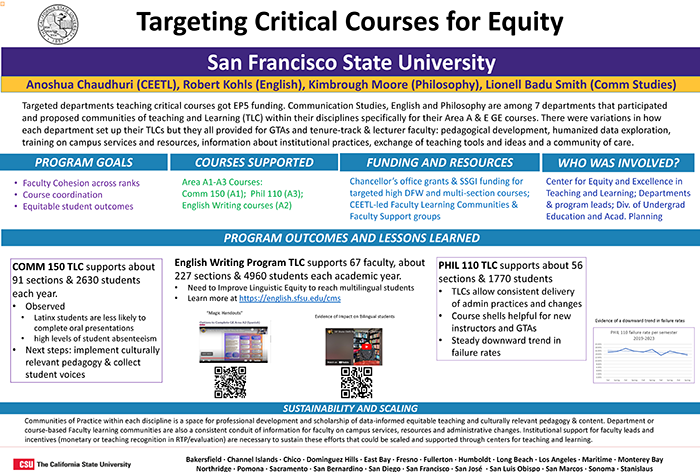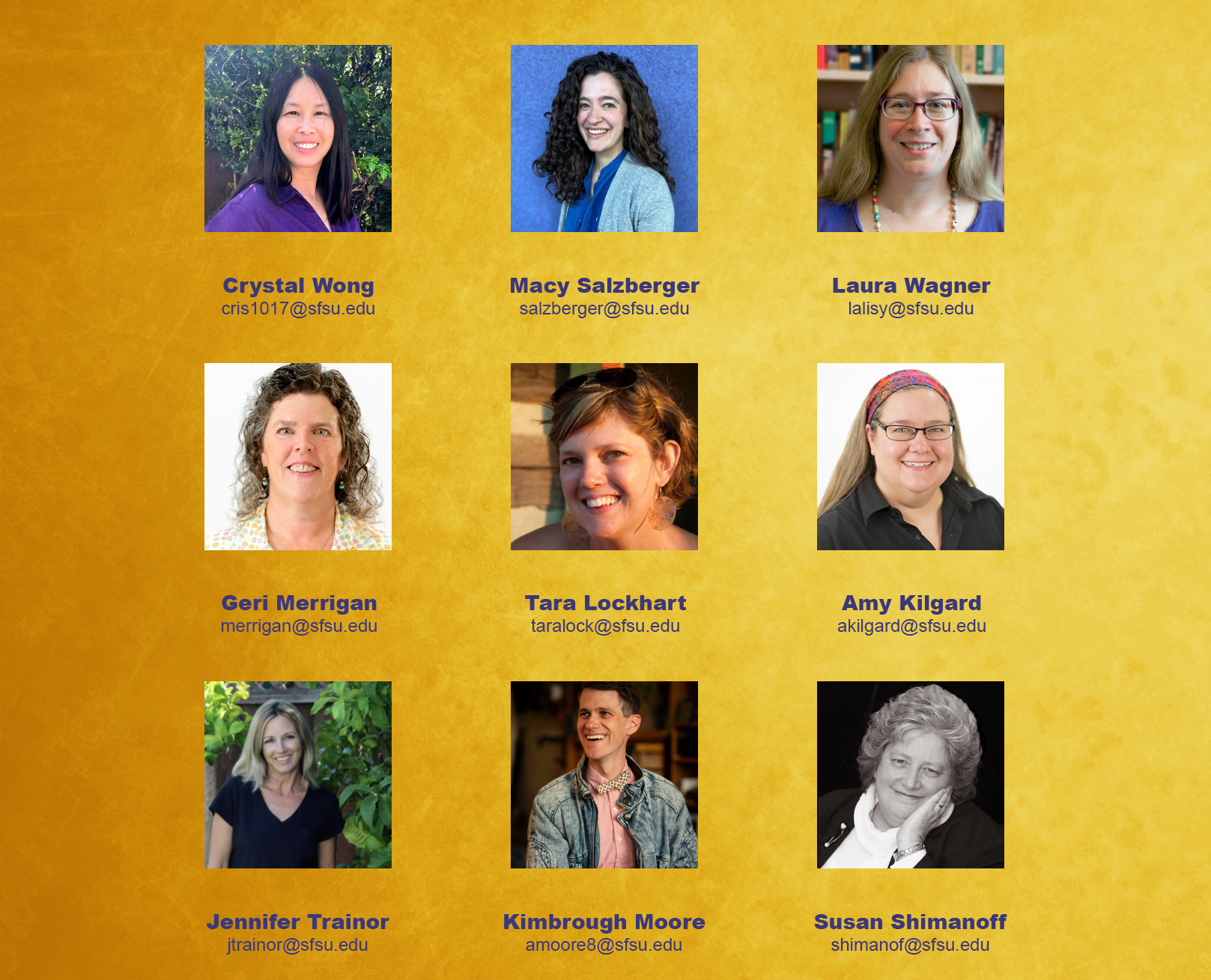
Over the past five years, CEETL has extended support to faculty teaching general education courses with high failure rates. Departments that have participated in CEETL’s communities of practice, and a community of care for program leads are English, Communication Studies, Philosophy, Economics, History, Accounting, Political Science, and in some years Mathematics.
In 2023-24, EP5 community of care included English, Communication Studies, Philosophy, Economics, History and Accounting. Program leads met monthly to collaborate and exchange ideas to support faculty communities of practice and strategize ways to identify student needs, and reduce failure rates and equity gaps.
The following poster demonstrates the learning that occurred for critical courses for student success and retention and the work that remains.

Reports from each of these departments are available upon request. Key Highlights are:
- There is a steady decline in failure rates in these courses, especially those taught by faculty who have participated in communities of practice.
- Student absenteeism has been on the rise since COVID-19 and has neutralized many of the gains that were made through faculty professional development.
- English has seen the benefits of paying attention to linguistic equity by providing ‘magic handouts’ to support student completion and retention.
- Communication Studies have found the need to support Latinx students in oral communications skills which will likely lead to greater completion rates.
- Philosophy has seen the benefits of early alert programs but only for students who respond. There may be personal and institutional barriers to student completion that are worth investigating.
- Economics found that those faculty participating in communities of practice were able to reduce student failure rates. Communities of practice have been beneficial for course cohesion, exchange of course materials, and reduction of course material costs.
Student Success Effort in 2022-23

Collaborative Course Coordination
Nuanced Data Gathering
Increased Professional Development Opportunities
Engaging Course Redesigns
Improving Student Success in First-Year Courses
The First-Year Student Success Collaborative aims to create cross-program curricular connections, academic engagement, and social belonging in the first year. Our collaborative supports cross-programmatic
- professional development and teacher learning communities
- data gathering and sharing
- dissemination of best practices.
The results of our collaboration include the widespread adoption of antiracist and asset-based teaching approaches; improved student engagement; and gains in first-year students' confidence and learning.
SUCCESSES
Over the last several years, faculty across the “Golden Three” areas of Critical Thinking (A3), Written Communication (A2), and Oral Communication (A1) have partnered with the Center for Equity and Excellence in Teaching & Learning (CEETL) to build stronger course coordination both within and across our programs, moving toward a more mature model of educational leadership and inclusive teaching.
Working together, we evaluate pedagogical approaches to reduce DFWU rates in first-year courses, celebrate our successes, provide mutual support, and innovate practice.
Our cross-programmatic working group has addressed current challenges like ChatGPT and AB 928, while also prioritizing the discussion of equity-minded and inclusive pedagogies (i.e. anti-racist practices, student-centered course design, universal design for learning, equitable grading practices, data-informed practices, belonging in the first year). We brainstorm strategies and interventions to eliminate equity gaps and improve course completion rates.
To improve DFW rates and close equity gaps, faculty leaders across the Golden Three have worked together to collect and share data within each of our programs:
-
We examined whether students who receive a DFWU in one first year class also receive a DFWU in another. 80% of these students do. This more nuanced understanding of DFW rates allows us to work collaboratively toward holistic approaches to student success across students’ first-year courses.
-
We tracked case-by-case DFWUs, discovering that nearly all DFWs in A2 are actually “unauthorized withdraws.” This data is reshaping our faculty development toward retention rather than course design and grading.
-
We conducted hour-long equity and student success interviews with individual teachers to learn about their efforts and challenges in retention efforts.
-
We tracked students’ gains in confidence and self-efficacy.
-
We conducted a study of student success in COMM 150.
-
We conducted a study of teacher engagement and burnout.
-
We have gathered over 1500 end-of-term student reflections and analyzed them to better understand student experiences in the first-year.
Golden Three faculty leaders have increased professional development opportunities across all programs. From weekly webinars to half-day workshops to faculty learning communities, we have reached over 80% of the teachers in our programs. Workshops and webinars cover engagement, accessibility, inclusion, belonging and equity:
-
Responding to and Integrating ChatGPT
-
From High School Seniors to First-Year College Students
-
Critical Thinking Meets Historical Thinking
-
Rethinking How We Teach US History
-
Equity Refresher: Creating Safe Interactions in the Classroom
-
Improving Learning via Holistic Health Strategies
-
Commenting on Multilingual Student Writing
-
How To: Antiracism, with Antidotes to White Supremacy Culture
-
Building Financial Literacy for Retention
-
Fostering Community and Engagement in Our Classrooms
-
Supporting Our Students in Crisis
-
Equity and Community Inclusion at SF State: Supporting LATINX students
-
The (Un)Grading Webinar
-
Critical Information Literacy and the Library
-
Making Equity-Minded Grading Decision
-
“Post-pandemic Pedagogy”: Engaging Students in Active Learning
Golden Three faculty leaders have built template courses with model assignments and innovative pedagogy designed to improve student success and close equity gaps. In addition, we have supported individual faculty course redesigns, and routinely share these redesigns with other faculty.
Template courses and course redesigns are focused on accessibility, equity and student engagement.
Redesign and model courses include:
- Units on linguistic justice and linguistic racism
- Units examining mental health, stress, and grades
- Units that involve students in reflecting on their purpose and goals
- Units that ask students to reflect on their study habits, and their reading and writing practices
THE FUTURE
Going forward, we seek continued support for cross-program coordination. In the coming year, we hope to:
- Enable key revisions to our first-year programs
- Explore built-in “catch up” weeks for students who struggle
- Explore no zero grading policies
- Expand learning communities to increase peer support for students, particularly based on Supportive Pathways pilot (CO grant) for AY 23-24
- Find ways to better support part-time faculty who commute or teach at multiple institutions
Support the development of benchmark goals and expansive criteria for student success
- Continue to support faculty-driven assessment of student work across sections
- Share student work via Sutro Review and the LCA Student Research Showcase
- Support teaching excellence (over the past several years, a large number of first-year teachers have won campus teaching awards)
- Gather more nuanced data about student success in the first-year so that we can better understand how our classes benefit students
- Qualitative data on student success (why students leave, faculty explanations for equity gaps; student perspectives)
- Finer-grained quantitative data, as well as more specific data on equity gaps
- New measurements of success, including NSSE trends and program assessment data
